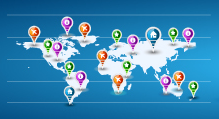How to Reach More Prospective Attendees Without Blowing Your Digital Marketing Budget

Every event marketing team has its own unique set of goals and challenges. But one common theme that we hear often, especially from marketers responsible for events that are still in the nascent stage, is that they are being tasked with increasing conversions with relatively low incremental investment in resources.
Unfortunately, there is no magic formula for meeting this challenge, but there are several techniques and best practices that can enable you to reach out to and connect with a wider audience without breaking the bank.
Here are some recommendations that you should definitely consider:
Partner with Your Current Attendees, Exhibitors & Sponsors
Forge alliances with leading brands, organizations and influencers in your industry. Besides lowering your costs, it may enable you to reach new audiences and add as yet unexplored but high-potential niche segments to your event with relatively low investment.
Incentivizing your recent audience for bringing more registrations and traffic to your events can be a highly effective strategy. Encourage your motivated participants to spread the word about your events among their peers and followers.
According to Neilsen.com, 84 percent of consumers say they either completely or somewhat trust recommendations from family, colleagues, and friends about products and services – making these recommendations the highest ranked source for trustworthiness.
This is a telling statistic and just as relevant to the events industry as any other. Word of mouth appreciation and commendations from an exhibitor or attendee who achieved high ROI by participating in your previous event can be just as effective in promoting your event as any fancy digital ad campaign.
Make Your Event Truly Newsworthy with Cross-Channel Promotion
Repurpose and repost every positive mention or content for your brand on as many digital marketing channels as possible. Press releases, news articles, industry recognitions, participant testimonials, social posts by influencers – all these are often under-utilized assets just begging to be realized to their full potential. Don’t be shy about integrating your campaigns and reposting content across multiple channels.
According to cmo.com, while 9 out of 10 digital marketers and ecommerce professionals report high to medium impact of cross-channel marketing tools, only 14 percent of marketers say their organizations join up campaigns across all channels.
The key to success on digital distribution platforms is figuring out which channels are important to your market segment, their interaction level with each channel and the time slots that would deliver the highest engagement for your brand. It may take some experimenting followed by detailed data analysis to identify the permutations and combinations that work best with your prospective audience, but the results will definitely be worth the effort.
Optimize Your Event Website Content
Every new visitor who lands on your event website, whether through a referral or from a promotional campaign or even organically, needs to be treated like a potential attendee. If they are not engaged with easily accessible and compelling content that would convince them to attend your event, then it’s a lost opportunity for your brand.
According to econsultancy.com, for every $92 spent acquiring customers, only $1 is spent converting them. That is a truly shocking statistic.
Nothing is more daunting for a prospective registrant than to see a “coming soon” message on an event website with no further information to answer their ‘what, where, when and why’ questions. Converting from their first visit may be your best option. And yet, if they leave disappointed and unimpressed, there’s no guarantee that they’ll ever return to register for your event.
Leverage Your Technology Platform and Service Providers
Digital technology has evolved significantly in the recent years and is increasingly becoming the core engine driving innovation across all sectors of the global economy. The challenge for the events industry is in harnessing technology to emphasize the preeminence of people in the age of integrated technologies and connected devices.
Eighty-six percent of the business and IT executives interviewed for Accenture’s 2016 Technology Vision Survey felt that the pace of technology will increase in their industry either rapidly or at an unprecedented rate. On the one hand, the cost of implementation is dropping, and on the other, the quality of automation techniques and processes is rising exponentially.
Integrating your digital marketing campaigns and media with your event management and CRM solutions will definitely help you segment your audience better, trigger campaigns based on audience behavior and analyze the digital footprints of your audience much faster.
If that sounds intimidating, you could start by asking your event management solution provider if there are any marketing features and services offered by them that you are perhaps not yet leveraging? Your team may end up saving dozens of additional hours every month by putting the expertise of your technology partners to work for you, thus freeing up your time to focus more on promotional efforts than in being bogged down by the logistics of managing your events.
Last but not least, as they say in the advertising industry, experience matters more than exposure.
Just creating awareness for your events is not enough. People tend to gravitate to, remember and recommend events that engage their emotions and requirements. It’s natural that attendees search for memorable moments that put their personal, professional and business interests on the center stage. The ability to deliver on that is the biggest asset for face-to-face event organizers and something your marketing team should definitely capitalize on!


Add new comment